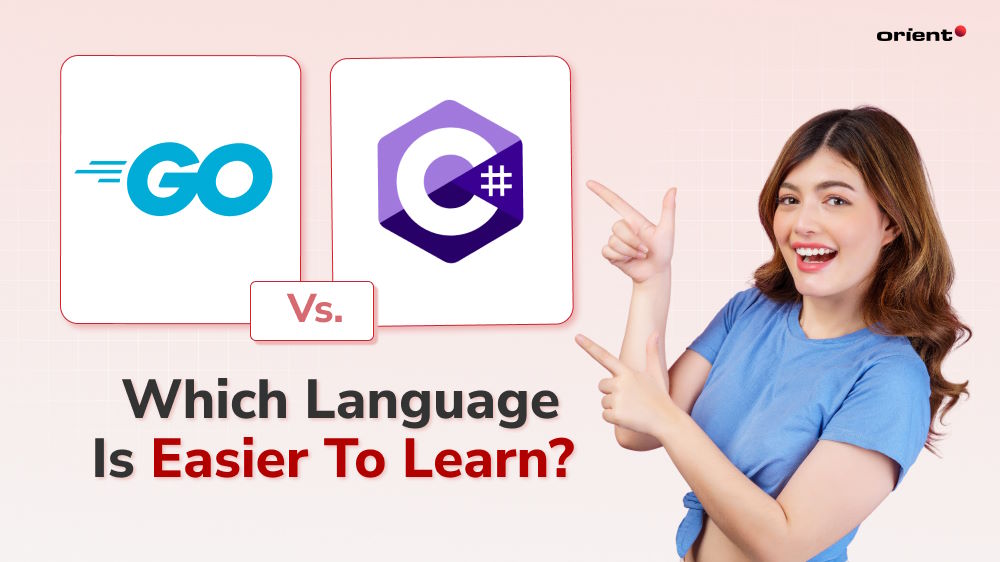
C# vs. Golang: Which Language Is Easier to Learn?

Content Map
More chaptersDevelopers everywhere face fierce choices daily - pick the right among popular programming languages or miss the boat. With millions embarking on coding careers, according to statistics, framework selection shapes one’s profitable path. C# and Golang are two giants of backend development famous for their high-level abstraction and simplicity, but which offers a smoother learning curve?
Recent discussions in the developer community suggest that Golang offers a gentler learning curve for newcomers. It’s praised for its simplicity and the ability to get up and running quickly. In contrast, C# might present a steeper initial climb due to its extensive features and dynamic nature. However, this complexity can be a testament to its power and versatility.
In our comprehensive article, we delve into the intricacies of both languages. We’ll explore the pros and cons, share experiences from the trenches, and provide you with the statistics you need to decide which language aligns with your learning style and development goals. Stay tuned for an insightful journey into the world of C# vs. Golang.
Understanding Your Programming Languages Background
The path of learning a new programming language is deeply personal and can vary significantly based on one’s background. For individuals with prior programming experience, certain concepts may be more intuitive, while others could present a new challenge. It’s important to acknowledge that the ease with which you learn C# or Golang can be influenced by your familiarity with programming paradigms, languages, and concepts.
If you have experience with other programming languages, you may find one of these languages easier to learn than the other. For example, if you have a background in C++ or Java, you may find C# easier to learn because it shares many similarities with these languages. C# is a general-purpose language that is often used for building applications, web development, and other software. It also has a native graphical user interface (GUI) library and supports cross-platform binaries through .NET Core Runtime.
On the other hand, if you have experience with scripting languages like Python or Ruby, you may find Golang easier to learn. Golang is a statically typed, well-known web development language that is often used for building infrastructure-related software components, such as web servers, databases, and network tools. It also has a unique approach to error handling, which uses multiple return values instead of exceptions.
Additionally, your operating system and software development goals can also influence which language is easier to learn. For example, if you are developing for Windows, C# may be a better choice because it is the native language of the platform and has extensive support for building Windows desktop applications. However, if you are developing multiple distributed systems or need to build cross-platform binaries, Golang may be a better choice because it supports cross-platform development and has a simple and efficient build system.
Of course, prior programming experience is not a requirement for learning C# or Golang. Even if you are a complete beginner, you can still learn either language with the right resources and dedication. However, it’s important to recognize that your previous experience can influence how quickly and easily you can pick up new skills. Understanding your background can help you choose the right language for your needs and set realistic expectations for your learning journey.
C# vs. Golang under the Language Fundamentals Scope
When comparing C# and Golang under the scope of language fundamentals, several key aspects come into play. This can be very useful for evaluating which language to learn, as it allows software developers to assess the tradeoffs and determine which language aligns better with their preferences and requirements. Let’s delve into each area to gain a comprehensive understanding of how these languages differ.
Syntax
C# is a statically typed, object-oriented language with a rich set of features. Its syntax is designed to be familiar to those who have experience with C or Java. For example, C# uses braces {} to define scope and semicolons to terminate statements, which can make the code verbose but also very explicit. This verbosity can be advantageous for maintaining and scaling complex applications, as it can lead to more readable and maintainable code.
Golang, or Go, is also statically typed, but it takes a more minimalist approach to syntax. Go’s syntax is designed to eliminate unnecessary ceremony, emphasizing readability and simplicity. It utilizes indentation for code blocks, reducing the need for curly braces. This can lead to cleaner and more concise code, but it can also be less forgiving of errors in indentation.
Functions and Testing
C# functions are feature-rich, supporting advanced concepts like closures, delegates, and events. This allows for a high degree of expressiveness and flexibility in how functions are defined and used. C# also supports asynchronous programming with async and await, making it easier to write non-blocking code. Moreover, C# has robust unit testing capabilities. It integrates seamlessly with tools like NUnit, MSTest, and xUnit, providing a comprehensive embedded testing environment within the .NET framework. This support for unit testing ensures that each function can be tested in isolation, contributing to more reliable and maintainable code.
Golang functions are more straightforward but still offer powerful features like goroutines for concurrency. Its native code compilation provides rapid execution, making it ideal for applications that require prompt responses. Go’s approach to error handling is also notable, with functions commonly returning multiple values to include both the result and an error state. This explicit handling of errors can lead to more robust and predictable code. Additionally, Go supports unit testing natively with its built-in testing package, which simplifies the process of writing and running tests. This embedded capability encourages developers to test their code frequently and efficiently, leading to high-quality, dependable functions.
Data Types and Memory Management
C# supports a wide variety of data types, including primitive types (integers, floating-point numbers, etc.), strings, arrays, and more. It also provides extensive support for object-oriented programming, enabling the creation of custom data types through classes and structures. In C#, memory management is primarily handled by a garbage collector, which automatically deallocates memory when objects are no longer in use. C# developers can focus more on the logic of their code rather than manual memory management.
Golang, on the other hand, has a smaller set of built-in data types, focusing on simplicity. It provides basic types like integers, floating-point numbers, strings, booleans, and more. Golang’s emphasis on simplicity is reflected in its limited set of data types. Golang employs manual memory management for memory management. Developers need to explicitly allocate and deallocate memory, which can provide more control but also requires a deeper understanding of memory management concepts. Golang’s manual memory management approach can be advantageous in scenarios where fine-grained control over memory allocation is crucial.
IDE/Editors
C# has a strong backing from Microsoft, which provides a robust and feature-rich IDE in the form of Visual Studio. It’s widely regarded as one of the best development environments for C#, offering a plethora of tools and extensions for various needs. Additionally, developers can opt for Visual Studio Code, a lighter and cross-platform editor that still supports C# development through extensions. Another popular choice is Rider from JetBrains, which is known for its powerful refactoring capabilities and seamless .NET integration.
Golang also benefits from solid IDE support. The most notable is GoLand, a dedicated Go IDE from JetBrains, which offers extensive features for Go development. Developers who prefer lightweight editors can use Visual Studio Code with the Go extension, which provides a good balance of functionality and performance. Other editors like Vim and Emacs can also be configured for Go development with appropriate plugins.
Documentation/Learning Resources
C# benefits from Microsoft’s backing and a large community of developers. There is a vast array of resources available for learning C#, from official documentation and tutorials to community-driven blogs and forums. The .NET ecosystem also provides a wealth of libraries and tools that can help developers create applications quickly and efficiently.
Golang has a strong emphasis on documentation and readability. The Go community values clear and concise code and this is reflected in the resources available to help people learn the language. The official Go documentation is thorough and includes a tour that provides a hands-on introduction to the language’s features. Additionally, the Go community contributes to a growing collection of open-source libraries and tools.
Finding the Right Fit

After comparing C# and Golang based on the specific factors discussed, it’s clear that the winner of which language is easier to learn depends on the individual’s prior programming experience and goals.
Considering syntax and memory management, Golang appears to have a slight edge in terms of initial ease of learning. Its minimalist syntax and lack of explicit memory management can be attractive for beginners. However, C #’s native GUI solution, strong typing, and structured approach can be beneficial in the long run, especially for large projects, as it helps prevent errors and promotes code maintainability.
Experience Levels
- Beginners: If you’re entirely new to programming, Golang’s simpler syntax and lack of complex memory management might make it easier to grasp the fundamentals. However, C #’s abundance of learning resources can be helpful for beginners who learn best with structured guidance.
- Intermediate Programmers: Programmers with some experience in other C-style languages like C++ or Java will likely find C #’s syntax familiar and comfortable. Golang’s unique features can still be appealing to those who value simplicity and control.
- Advanced Programmers: Experienced programmers can effectively utilize both languages. C #’s rich ecosystem and strong typing can be advantageous for large-scale enterprise applications, while Golang’s speed and concurrency features might be ideal for performance-critical tasks or microservices architectures.
For readers trying to decide between C# and Golang, consider your project requirements, your experience level, and the kind of development environment you thrive in. Ultimately, testing out both languages is the best approach to finding the one that suits you the most. Experiment with small projects, explore the communities and see which language aligns with your development style and goals. Remember, the “winner” is the one that best suits your needs and helps you achieve your objectives with greater ease and efficiency.
If you’re considering embarking on a project and need expertise in both C# and Golang, Orient Software is a company that is proficient in these technologies. With a team experienced in both languages, we can provide tailored solutions that meet your project’s specific requirements. Whether you’re developing enterprise-level applications with C# or building efficient, scalable systems with Golang, Orient Software’s expertise could be an asset to your project’s success.
To make an informed decision, you might want to reach out to Orient Software for consultations or to review our portfolio of past projects. This can give you a better understanding of their capabilities and how we can assist in achieving your software development goals. Remember, the right partnership can make a significant difference in the outcome of your project.






